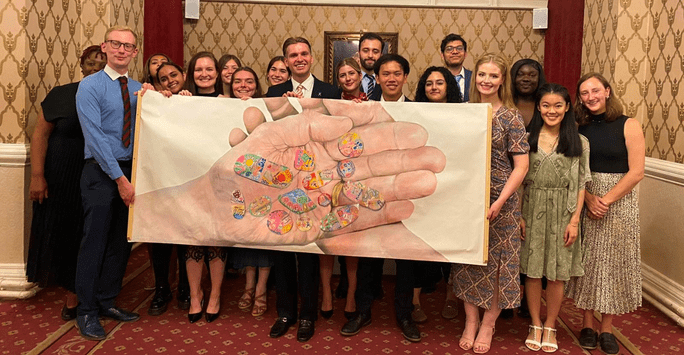
Liverpool Student Doctors Kartik Goyal, Natalie Georgopoulou, Olivia Greene and Matthew Heneghan have been playing an active role in an NHS Social Prescribing Scheme and are looking to bring more student champions on board for this academic year.
Dr Kathryn J Harrison, GP Theme Lead at Liverpool School of Medicine, describes the important role social prescribing plays within primary care and the wider NHS.
“Social prescribing is fantastic in promoting wellbeing and directing patients to non-clinical support available within their local area. Our students’ involvement in the scheme is a great way to help spread this message amongst the student community.”
Dr David Lewis, GP and Community Clinical Teaching (CCT) Lecturer commends the benefits of social prescribing to a patient’s mental as well as physical wellbeing.
“When people are anxious or low or depressed, they often stop doing the positive, enjoyable, meaningful things in their life. This worsens their mood and their physical symptoms and health.
Social prescribers are experts in helping people to start, or restart, these positive activities.
In many ways it doesn’t matter what the activity is, as long as it is something, and they want to do it. Social prescribers take the time to listen to people’s priorities and work with them to choose from a variety of local activities. For some patients, social prescribing can transform their life and empower them to start living rather than existing.”
Students Kartik, Natalie, Olivia and Matthew lay out the A-Zs of Social Prescribing for us.
What is social prescribing in one sentence?
Social prescribing is the process by which healthcare professionals (usually GPs, nurses and other primary care professionals) help improve patients’ health and wellbeing by referring them to a range of local, non-clinical services. For example, volunteering, music groups, educational programmes, gardening, healthy eating advice amongst other activities.
What is social prescribing not?
Social prescribing is not just signposting; it’s a way of helping people take much more active steps to engage with their communities and have more control over their own health. Additionally, social prescribing is not a substitute for mental and physical therapies; but should be used in conjunction with these treatments to treat patients in a holistic way; recognising the range of social, economic and environmental factors that affect our health and wellbeing.
What are the biggest benefits to patients?
Social prescribing addresses patients’ needs in a holistic way and encourages community-centred ways of working. This in turn supports the movement of the NHS into prioritising personalised care – putting patients at the centre of decision making with respect to how their care is planned and delivered and taking into consideration their individual needs.
By referring patients to link workers who can provide them with community groups and agencies for practical and emotional support, health literacy is also increased.
This means that long-term health conditions are managed better, patients can engage with preventative programmes and make more informed healthy lifestyles choices, and can choose and adhere to medication regimes that suit them best.
Social prescribing therefore benefits patients by giving them more choice and control and helps build a sense of belonging by encouraging patients to get involved with their community groups.
What is the NHS Social Prescribing scheme all about?
The NHS scheme aims to raise awareness of social prescribing amongst healthcare students.
When the scheme first started, social prescribing was an up and coming movement.
A medical student from Exeter originally founded the scheme with the idea that by allowing medical students to be aware of the positive impact social prescribing can have on the lives of patients, doctors of the future will know how and when to direct patients to social prescribing services.
Since it was founded, the scheme has grown in size, and now has 18 regional leads and 162 student champions. It is continuing to grow, and medical students are now working with Allied Health Professional (AHP) students throughout the UK to not only promote social prescribing, but lifestyle and preventative medicine too.
How can I get involved?
The best way to get involved is by applying to the student championship scheme opening for applications next month. Keep a look out for the opportunity in the Student Bulletin! The application comprises of a few questions on your understanding of social prescribing and your experience of teamwork and leadership.
As champions you will be responsible for organising a social prescribing event targeted towards medical students and AHP students, with ample support available to you from the national committee.
Additionally, you will get the chance to attend the annual social prescribing conference held after the Spring break, which is a great way to network with like-minded students, link workers and general practitioners.
You are also free to do some research on the topic. If you are a year three student, you could use your RS opportunity to find a GP mentor and work together on publishing more evidence for social prescribing.
What kind of activities, events or resources should I be looking out for?
There are multiple social prescribing events happening every month and it would be great to get involved in these. You can follow the National Academy for Social Prescribing on social media to receive regular updates. You are also welcome to attend the annual conference!
Discover more
- If you would like to learn more about social prescribing, feel free to contact Student Doctors Kartik Goyal or Matthew Heneghan, North West Lead and Vice Lead of the national committee for 2022-23.
- Check out the National Academy for Social Prescribing website (link) and follow on Twitter (link) and Instagram (link).
- Interested in becoming a student champion? This Social Prescribing Student Champion flyer (PDF) has all the information you need.